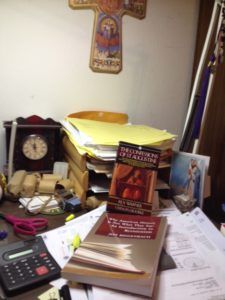Monday

Miscellaneous Rambling
Welcome to ordinary time. First week. The brown volume. * * * * * * * Marie redecorated our family room (courtesy of insurance moneys from flood damage last fall). She and my eldest daughter concluded that the blue volume of the breviary fit into the decor. Hopefully, the brown volume fits as well. * * * * * * * I don't read the books, of course, but they remind me of what I ought to be doing, and they make me appear oh-so righteous. "Look, he keeps the Divine Office in his family room. He must be Ferris Bueller" (see video below for reference). * * * * * * * Problem is, the only people who see my family room are people who know me . . . and know better. * * * * * * * Advent and Christmas have the Joyful Mysteries, Lent has the Sorrowful, and Easter has the Glorious. As Pope of TDE, I've declared the next few weeks (from now until Ash Wednesday/February 10th) the time for the Luminous Mysteries. * * * * * * * A thought occurred to me over the weekend: Could each major pre-Christ worldview be said to have latched onto one Person in the Trinity? Taoism, for instance, is strongly Holy Spirit (a fact that hit me fully when reading Wilfrid Stinissen's modern classic, Into Your Hands Father, especially this passage: "There comes a time when God's will moves from the front to the back, resulting in the disappearance of the light. I can no longer see where I am going. God is behind me, and I have only one thing to do: Let myself be pushed along"). Stoicism, too, seems Holy-Spirit bent. Judaism, of course, is the Father. And what system latched onto the idea of the Son? I'm not sure, but the god-man pagan myths seemed to sense that God Himself would have to come down to redeem fallen man. I also have no idea where to place Hinduism in this theory. Early Buddhism, too, though its later development into Zen is heavily Holy Spirit. * * * * * * * Like I said, it was just a thought. . . . And not alcohol-fuel, mind you. It was a fully sober thing. * * * * * * * That thought later developed into this idea: Could each major later non-Christian (or heretical) system, maybe each major philosopher, be "accused of" over-emphasizing one of the Persons to the exclusion of the other two? Islam, for instance, is obviously all Father to the exclusion of Son and Holy Spirit. Some messianic philosophers of the Middle Ages (Joachim of Fiore comes to mind, though I'm not remotely qualified to say much about him) over-emphasized the Spirit. And where would I put Nietzsche? There, I'm afraid, the idea breaks down . . . or at least becomes borderline blasphemous.
